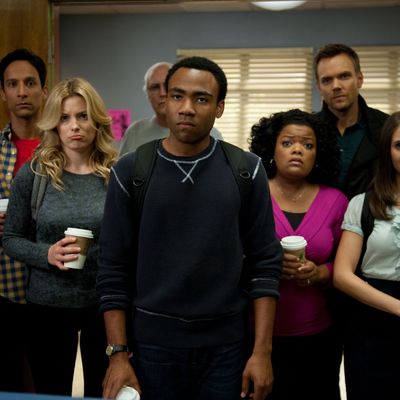
Last May, in the aftermath of Community creator Dan Harmon being fired from his own show, it emerged that execs from NBC and the show’s studio, Sony, had been frustrated by Harmon’s management style and his apparent belief that his corporate bosses were nuisances to be swatted away like flies at a picnic. A little more than a year later, he was rehired for season five, and judging from his recent comments on his Harmontown podcast in which he dumped on the show’s Harmon-less season four, calling it an “unflattering impression,” he has not become any more of a company man. While he subsequently apologized for his pod-rant to the show’s cast and crew, former executive producers David Guarascio and Moses Port, and anyone offended by his rape-watching analogy, he had no mea culpas for network or studio execs, instead doubling down on thoughts like, “Writers fighting other writers is the fucking American Dream in the eyes of Sony.” Harmon returning to Community is a fantastic thing for fans of the show, but one has to wonder, why did the bosses who let him go for his outspoken, stubborn behavior bring him back even though it’s quickly become clear that he hasn’t changed at all?
The most widely reported rationale for his return, reported by several media outlets and confirmed by Vulture via our own sources, is that the show’s cast, led by Joel McHale, heavily lobbied Sony to seek a rapprochement with Harmon. The belief among the actors was that the show was “less special” without Harmon guiding the ship, and his return would help energize the gang for a fifth season. (As it is, Vulture has heard from multiple sources that series regular Donald Glover is still making noises about not wanting to return for the full fifth season, even with Harmon back in the fold, so he has more time to pursue his Childish Gambino career. Reps for Glover did not return Vulture’s calls; a Sony publicity spokesperson would only say, “Donald Glover is under contract for Season 5 of the show.”) Keeping a cast happy is not unimportant for a studio like Sony, which isn’t connected to a big broadcast or cable network like most of its rivals. It needs to be seen as a place that’s friendly to talent, be it in front of or behind the camera, in order to compete with a studio such as 20th Century Fox, which can (and does) use its connection to Fox to woo creatives into its fold. Still, it seems naive to assume that Sony’s decision to hire back Harmon was simply about pleasing the stars of Community.
Sony, like any Hollywood studio, makes decisions based mostly on what’s in its best business interest; that’s not a slam, that’s the facts of capitalism. And in the case of Community, what’s best for Sony is that the show stays on NBC for as long as possible. Sure, the show already has enough episodes for syndication, and repeats begin on Comedy Central this fall. But the more episodes Sony makes for NBC, the more money it will reap from that deal (as well as its streaming agreement with Hulu). Syndication agreements are all tied to how many episodes of a show are available; the larger the final tally, the more money the studio rakes in. This is why ABC decided to pick up the final years of Scrubs after NBC bailed — keeping the show alive longer meant sister studio Touchstone could make even more syndication profits. And while it might seem contradictory, Sony’s decisions to fire and then rehire Harmon were actually both made with an eye toward keeping Community going for as long possible.
As we noted last year, Sony likely made the call to dump Harmon because it felt certain at the time that there was no way a Harmon-led Community would grow in the ratings and that, therefore, a fourth season of the show with Harmon steering the ship would absolutely be the show’s last. Bringing in new captains, writers who were open to a slightly less insular Community, might attract new viewers, or, at the very least, make NBC executives a bit happier about the show. Sony’s gamble: With Harmon on the show, Community would surely die after season four; without him, it stood a small chance of seeing a season five. And the bet paid off, sort of. NBC ordered a fifth season, something that seemed hard to imagine a year ago. But the showrunner change didn’t make Community any broader or more popular; ratings were actually down 11 percent last season. The shakeup also didn’t increase the Peacock’s enthusiasm for the show, as season four was delayed until late winter and got very little promotion, while the order for season five was half-hearted at best (only thirteen episodes, no spot on the fall schedule). And the Harmon-free run, while possibly buying some time, dampened critical enthusiasm for what had been one of TV’s most critically praised comedies, and also divided the show’s fandom among those who hated the Harmon-less show and those who tolerated it. Once again facing a situation where the upcoming season of Community is likely to be the show’s last, Sony made the 2012 gamble, but in reverse: Proceeding with the same watered-down show would surely mean the next thirteen would be the last thirteen, but bringing back Harmon would spark excitement in the atrophying fan base, and bring back true believers pumped to fight to keep Community alive for the mythical six seasons and a movie, and all the profits that come with it. That’s a “fucking American Dream” execs, fans, and even Harmon can get behind.




